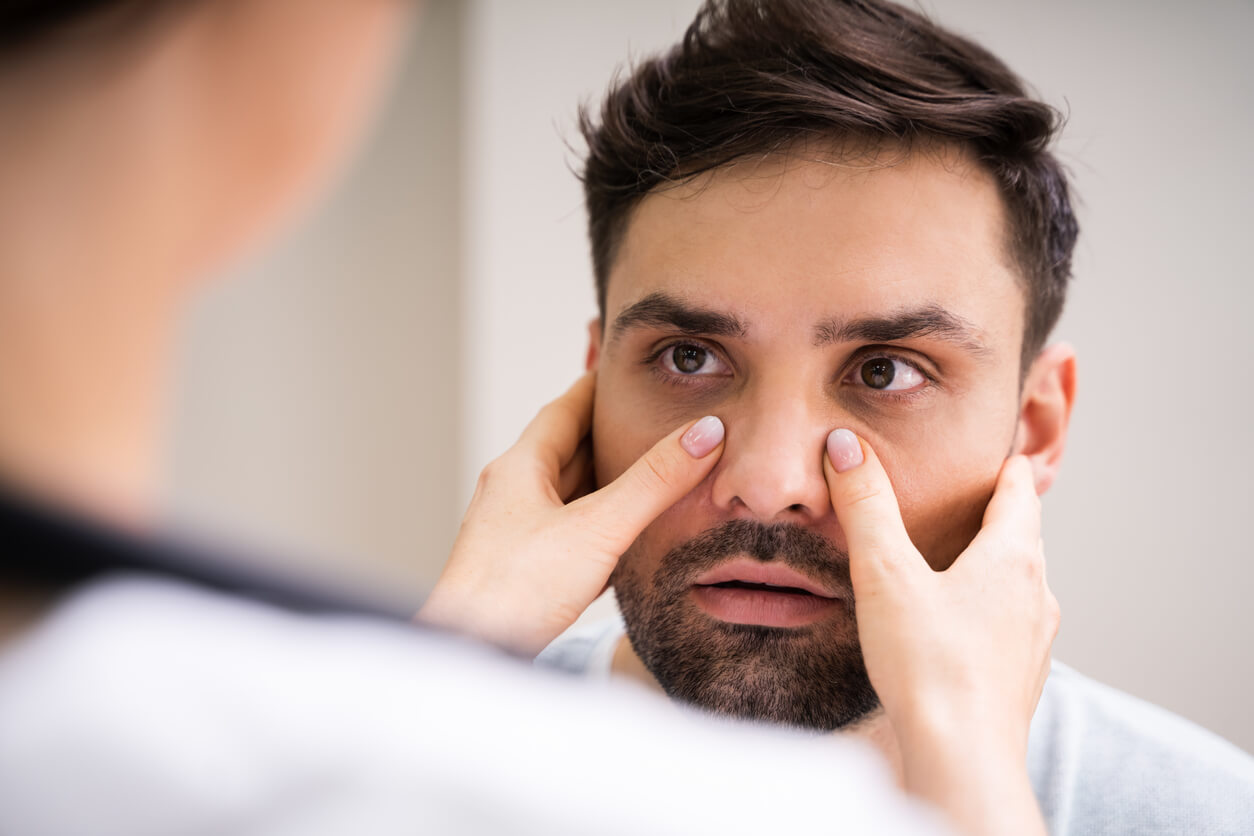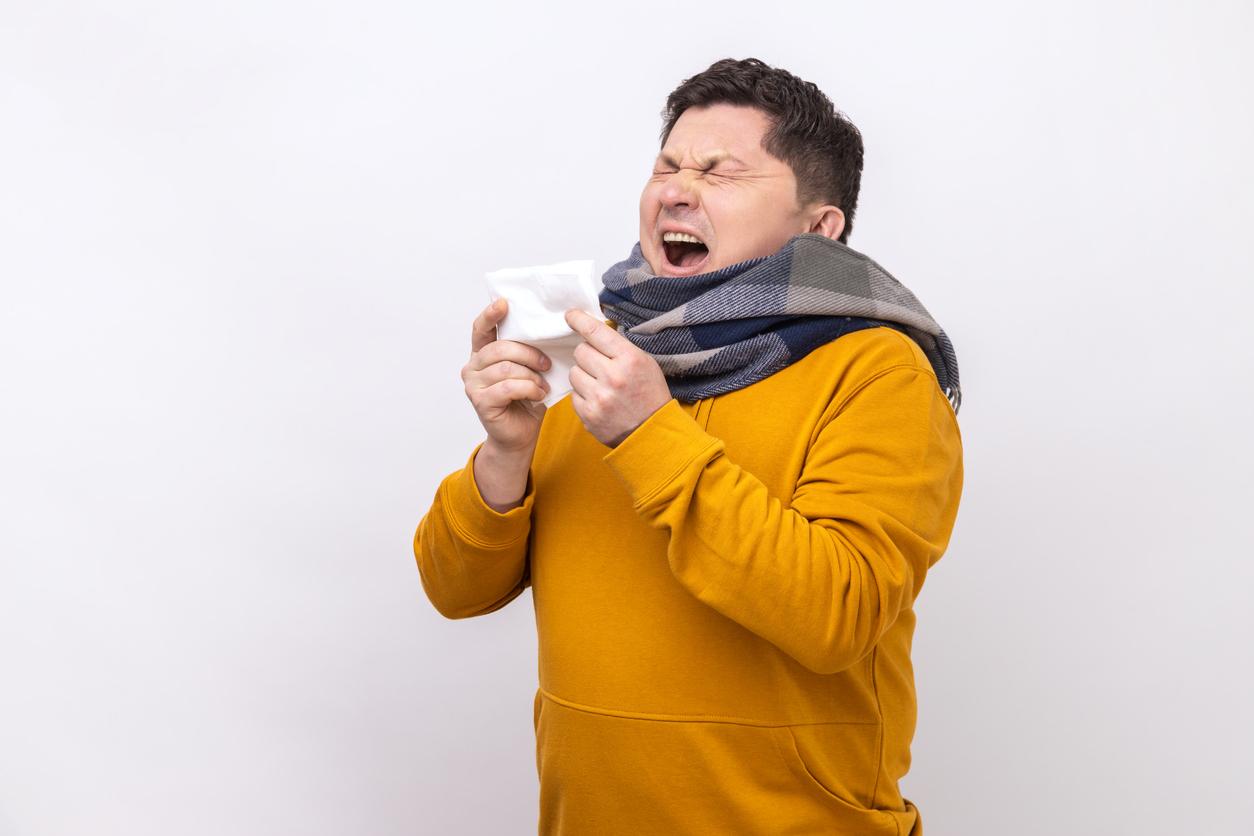OTC Sinus Infection Treatment: Medication and Home Remedies
Key takeaways
- Most sinus infections will go away on their own without prescription medication. Bacterial sinus infections, which are rare, require antibiotics.
- OTC decongestants, pain relievers, and nasal sprays can be used to help reduce your symptoms.
- At-home remedies to ease sinus discomfort include Neti pots, saline nasal sprays, and hydration.
A sinus infection, also known as sinusitis or rhinosinusitis, happens when the sinus cavities behind the nose, cheekbones, and forehead become infected. When those cavities get infected, they become inflamed and swollen. This leads to symptoms like a runny nose, nasal congestion, and facial pain.
Luckily, most sinus infections usually go away on their own after a few days. In the meantime, you can relieve many symptoms using the over-the-counter (OTC) medications and at-home remedies below.
What are common symptoms of a sinus infection?
Most sinus infections are caused by viruses and tend to improve on their own within a week or so. Common symptoms of a sinus infection include:
- Runny nose (nasal discharge)
- Stuffy nose (nasal congestion)
- Postnasal drip
- Sinus pressure/ facial pain
- Sinus headaches
- Bad breath
- Sore throat
- Upper jaw/ tooth pain
- Decreased sense of smell
- Fever
It's estimated that only 0.5%-2% of sinus infections turn into bacterial infections. However, if your symptoms last for more than 7–10 days, or if your mucus is thick, green or dark yellow, check in with your healthcare provider. These symptoms can be a sign of a bacterial sinus infection and will likely require antibiotics.
Best OTC medications for sinus infections
Over-the-counter medications won’t cure your sinus infection. However, they can help relieve your symptoms while your body fights off the infection. Below are some of the best OTC options for your sinus infection symptoms:
1. OTC decongestant nasal sprays
Decongestant nasal sprays shrink the blood vessels in the nasal passages, which reduces swelling. This helps alleviate sinus congestion. Decongestants are sprayed directly into the nose and start working right away.
Common OTC decongestant nasal sprays include:
- Afrin (oxymetazoline)
- Neo-Synephrine (pseudoephedrine)
You should only use a nasal decongestant for a few days. Repeated use can actually make your congestion worse.
2. OTC oral decongestants
Like OTC nasal decongestants, oral decongestants constrict the blood vessels in your nasal passages. This reduces swelling and opens up blocked sinuses, helping with congestion, facial pressure, sinus pain and more. Oral decongestants are taken by mouth and usually work within 30-60 minutes.
Common OTC oral decongestants include:
- Sudafed (pseudoephedrine)
It's important to note that oral decongestants can cause side effects like jitteriness, increased heart rate, or insomnia. If you have high blood pressure or other medical conditions, consult with your doctor before taking them.
3. OTC pain relievers
Over-the-counter pain relievers can help reduce symptoms like sinus pain, headaches, and tooth pain. These drugs are taken by mouth and usually start to work within 30 minutes.
Common OTC pain relievers include:
Talk to your healthcare provider before you start taking OTC pain relievers. Patients with high blood pressure or who take blood thinning medication should avoid using these drugs unless cleared to do so by a doctor.
4. OCT steroid nasal sprays
Steroid nasal sprays help reduce inflammation in the nasal passages. This can relieve congestion symptoms and headaches caused by a sinus infection. It may take a few days to notice the effects of steroidal nasal sprays.
Common OTC steroid sprays include:
5. OTC antihistamines
Antihistamines are usually used to treat allergy symptoms and aren't usually the first line of treatment for sinus infections. However, if allergies are making your sinus infection symptoms worse, antihistamines can help clear up congestion. They usually start to work within 30 minutes.
Common OTC antihistamines include:
Antihistamines usually come in the form of a nasal spray or oral tablet. Be sure to check the packaging of the medication you are taking, as some brands of antihistamines can make you drowsy (like Nighttime Benadryl). You should not drive a car or operate machinery after taking an antihistamine that makes you drowsy. Talk to your healthcare provider about the best antihistamine for you and the proper dosage for your treatment.
Here’s a look at OTC treatments and symptoms they can help treat.
| Symptom | Decongestant (nasal spray or oral) | Pain reliever | Steroid spray | Antihistamine |
|---|---|---|---|---|
| Runny nose | Yes | No | Yes | Yes |
| Congestion | Yes | No | Yes | Yes |
| Post-nasal drip | Yes | No | Yes | Yes |
| Facial pain | Yes | Yes | Yes | Yes |
| Headaches | Yes | Yes | Yes | Yes |
| Bad breath | No | No | No | No |
| Upper jaw/ tooth pain | Yes | Yes | Yes | Yes |
| Decreased sense of smell | Yes | No | Yes | Yes |
| Fever | No | Yes | No | No |
Best self-care remedies for sinus infections
In addition to OTC medication, several home remedies can ease uncomfortable sinus infection symptoms.
These include:
1. Saline nasal sprays
Saline nasal sprays (like Simply Saline) are non-medicated sprays that rinse and clean the nasal passages. This helps loosen mucus, reduce congestion, and soothe irritated nasal tissue.
2. Neti Pots
Neti Pots are used for nasal irrigation. To use one, put iodide and preservative-free salt water into the chamber. Boil the water first to sanitize it. Wait until the water is room temperature before you put it in the Neti Pot. Pour the solution into each nostril, per the device’s instructions. This salt water rinse can help reduce congestion and pain caused by a sinus infection while cleansing the affected area.
3. Hydration
Be sure to drink plenty of fluids - at least 15.5 cups of water per day for men and 11.5 cups per day for women. Fluids help thin your mucus, allowing it to drain from the nasal passages more easily.
4. Steam and humidifiers
Moistening the sinus cavities with steam or a humidifier can break up mucus and relieve congestion. Try draping a towel over your head and breathe in the vapor from a bowl of hot water. Taking a hot shower and inhaling the warm, wet air can help as well. If you're using a humidifier, make sure you use filtered water in the chamber.
5. Warm compresses
A warm compress applied to your nose and forehead may help with pain from a sinus infection. The heat improves circulation and helps relieve congestion.
| Symptom | Saline spray | Neti Pot | Hydration | Steam & humidifier | Warm compresses |
|---|---|---|---|---|---|
| Runny nose | Yes | Yes | No | Yes | Yes |
| Congestion | Yes | Yes | Yes | Yes | Yes |
| Post-nasal drip | Yes | Yes | Yes | Yes | Yes |
| Facial pain | Yes | Yes | No | Yes | Yes |
| Headaches | Yes | Yes | No | Yes | Yes |
| Bad breath | No | No | No | No | No |
| Upper jaw/ tooth pain | Yes | Yes | No | Yes | Yes |
| Decreased sense of smell | Yes | Yes | No | Yes | Yes |
| Fever | No | No | No | No | No |
When should I see a doctor about a sinus infection?
While many sinus infections go away on their own, fungal or bacterial sinus infections may require specific prescription medication. An underlying condition like nasal polyps can also cause persistent sinus infections that require advanced treatment.
Speak to a healthcare provider if:
- Sinus infection symptoms last for more than a week
- Your symptoms get increasingly worse
- Your mucus has become extremely thick and green or dark yellow
- Your symptoms are accompanied by a high fever
- You experience sinus infection symptoms with confusion, vision problems, and/ or swelling and redness around the eyes
- You have a personal history of chronic sinus infections
These are often signs of a severe infection that requires prescription medication.
How Sesame can help
Experiencing the symptoms of a sinus infection or have questions about treatment? Book a same-day visit on Sesame to get sinus infection treatment online. You'll be able to speak to a licensed healthcare provider right away via video.
During your visit, your provider can assess your symptoms and prescribe medication for same-day pickup if appropriate!









